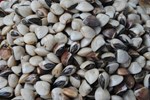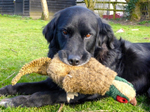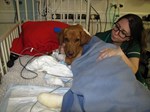Search - News & Events
11 - 20 of 183 results
-
Royal Veterinary College supports One Health Day
The RVC is putting on activities today to raise awareness of the One Health approach to medicine, and showcase the research undertaken to tackle major threats to human and animal health. One Health is a growing principle which recognises that … -
The RVC awarded funding to advance mollusc aquaculture sustainability in southeast Asia
UK Research and Innovation (UKRI) has granted funding to the Royal Veterinary College (RVC) as part of a crucial project researching the sustainability of mollusc aquaculture in southeast Asia. As a popular livelihood and key source of food supply, …UK Research and Innovation (UKRI) has granted funding to the Royal Veterinary College (RVC) as part …
-
From the geometry of a toppling table to a new ‘grazing’ gait? And perhaps why monkeys walk weirdly
In a new paper published in the Royal Society journal Biology Letters, two Royal Veterinary College (RVC) experts exploited the geometry of a wobbly table to explain the ‘grazing’ gait in quadrupeds as well as walking in primates. Very simple … -
World first, RVC finds cognitive impairments in dogs with epilepsy
A series of pioneering research studies from the Royal Veterinary College (RVC) into dogs with epilepsy have revealed that: Dogs with epilepsy find it harder to obey commands, are slower to learn new tricks, have spatial memory deficits and are easily distracted. Aversive training methods, such as bark-activated collars, prong collars and verbal punishment are associated with poor trainability and their use should be avoided. Some anti-epileptic drugs (the medications commonly used to treat seizures) were found to worsen the cognitive impairment of dogs with epilepsy. Dogs with greater exposure to training activities, including obedience classes, agility, and gun-dog training, were found to be associated with higher trainability and have fewer signs of cognitive dysfunction.You can’t teach epileptic dogs new tricks? A series of pioneering research studies from the Royal …
-
Gastric bloat: 80% survival of surgical cases shown in VetCompass study
An RVC-led epidemiological study involving dogs from across the UK has blown the myth that gastric bloat is almost always a death sentence for affected dogs. -
New report finds domesticated animals are most frequent source of recurring human illness
A new report led by the Royal Veterinary College (RVC) and published by International Union for Conservation of Nature (IUCN), has found that contact with and trade of domesticated animals and their products are by far the most frequent source of …A new report led by the Royal Veterinary College (RVC) and published by International Union for …
-
New poster: most common disorders in UK cats!
What disorders commonly affect our cats? A new educational poster in the Medivet/RSPCA/VetCompass collaborative infographic series was released last week. This new poster summarises the results of a VetCompass study looking at the most … -
RVC part of driving force to solve deadly dog disease - CRGV
RVC part of task force to solve deadly dog disease - CRGV (also known as Alabama Rot or New Forest Syndrome) -
RVC retains its HR Excellence in Research Award
We are delighted to announce that the RVC has retained its HR Excellence in Research Award. As part of our ongoing commitment to the principles of the Concordat to Support the Career Development of our Researchers, a 6 year internal review was …We are delighted to announce that the RVC has retained its HR Excellence in Research Award.
As …
-
New Newton Institutional Links grant awarded to RVC
Professor Dirk Pfeiffer and Dr Timothée Vergne have been awarded a Newton Institutional Links grant by the British Council to work on the transmission of highly pathogenic avian influenza in free-grazing duck populations in Vietnam. Despite …Professor Dirk Pfeiffer and Dr Timothée Vergne have been awarded a Newton Institutional Links grant …








